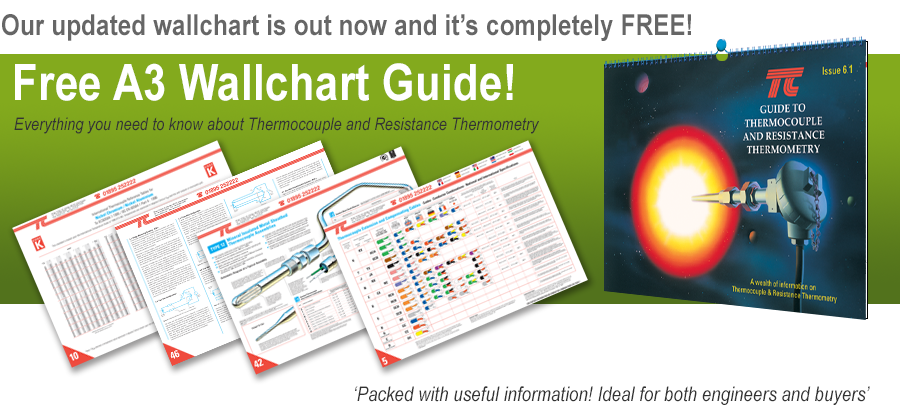Type E Thermocouple - Technical Information
Type E - Nickel-Chromium vs Copper-Nickel, IEC 60584-1
Thermocouple Type E, also known as Chromel-Constantan, this thermocouple is known for its high output - the highest of the commonly used devices, although this is less significant in these days of ultra stable solid state amplifiers. The usable temperature range extends from about -250°C (cryogenic) to 900°C in oxidising or inert atmospheres. Recognised as more stable than Type K, it is therefore more suitable for accurate measurement. However, Type N still ranks higher because of its stability and range.
Type E Thermocouples - Typical Constructions and Styles
Type E Mineral InsulatedThermocouples
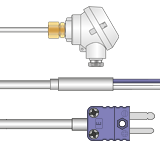 Rugged sensors, ideal for most applications. Vast choice of terminations e.g. pot seals, cables, connectors, heads etc.Type E Swaged Tip
Rugged sensors, ideal for most applications. Vast choice of terminations e.g. pot seals, cables, connectors, heads etc.Type E Swaged TipThermocouples
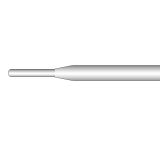 Fast response thermocouples ideal for industrial and other applications.
Type E Miniature
Fast response thermocouples ideal for industrial and other applications.
Type E MiniatureThermocouples
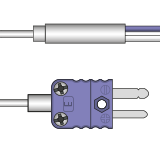 Ideal for precision temperature measurements where minimal displacement and a fast response is required.
Type E Heavy Duty
Ideal for precision temperature measurements where minimal displacement and a fast response is required.
Type E Heavy DutyThermocouples
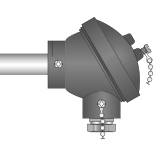 For industrial applications such as furnaces, kilns, ovens, boliers, flues etc. Many types of sheath material available.
General Purpose
For industrial applications such as furnaces, kilns, ovens, boliers, flues etc. Many types of sheath material available.
General PurposeType E Thermocouples
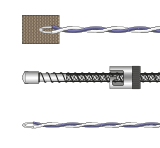 A wide range of thermocouples to suit many applications. Hand held, surface, bayonet, bolt, patch styles etc.
ATEX/IECEx Approved
A wide range of thermocouples to suit many applications. Hand held, surface, bayonet, bolt, patch styles etc.
ATEX/IECEx ApprovedType E Thermocouples
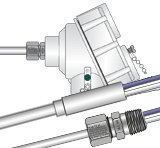 A large range of thermocouples with a variety of terminations such as pot seal, terminal heads etc.
A large range of thermocouples with a variety of terminations such as pot seal, terminal heads etc.
Explore our in-depth Thermocouple & RTD Guide — a technical resource developed for engineers and specifiers. Covers sensor selection, installation practices, standards and tolerances, colour codes, wiring configurations, sensor theory and more.
Type E - Technical Data
| Conductor Combination | Approximate generated EMF change in µV per ºC change (referenced to 0ºC) at: |
Approximate Working Temperature Range |
Thermocouple Output Tolerances to IEC 60584-1 | |||||||
|---|---|---|---|---|---|---|---|---|---|---|
| + Leg | - Leg | 100ºC | 500ºC | 1000ºC | Continuous | Short Term | Type | Class 1 | Class 2 | Class 3 |
| NICKEL - CHROMIUM Also known as: Chromel™, Tophel™, Chromium, Nickel | NICKEL - ALUMINIUM Also known as: Nickel-Copper, Constantan, Advance™, Cupron™ |
68 | 81 | – | 0 to +800ºC | -40 to +900ºC | Temperature Range Tolerance Value Temperature Range Tolerance Value |
–40°C to +375°C ±1.5°C 375°C to 800°C ±0.004⋅ |t| |
–40°C to +333°C ±2.5°C 333°C to 900°C ±0.0075 ⋅ |t| |
–167°C to +40°C ±2.5°C –200°C to –167°C ±0.015 ⋅ |t| |
2. Thermocouple materials are normally supplied to meet the tolerances specified in the table for temperatures above –40 deg C. These materials however, may not fall within the tolerances for low temperatures given under Class 3 for Types T, E and K thermocouples. If thermocouples are required to meet limits of Class 3, as well as those of Class 1 and/or Class 2, the purchaser should state this, as selection of materials is usually required.
3. The maximum temperature rating is dependant upon construction, size and atmospheric conditions. A more detailed guide for the maximum temperature ratings of mineral insulated thermocouples can be found here.
E Type Thermocouple Cable Colour Codes
| International Colour Code to IEC 60584-3 | ANSI MC96.1 | Redundant national colour coding for thermocouple cables | ||
|---|---|---|---|---|
| BS 1843 | DIN 43714 | NFC 42324 | ||
 |
 |
 |  |
 |
Frequently Asked Questions
- What is a thermocouple and how does it work?
A thermocouple is a type of temperature sensor that generates a voltage when two different metals are joined at one end and exposed to a temperature difference between the "hot" junction (where the temperature is measured) and the "cold" junction (the reference point). This voltage is then measured to determine the temperature at the hot junction. - How do I choose the right thermocouple for my application?
The ideal thermocouple depends on factors such as temperature range, accuracy, termination type, mounting requirements and environmental conditions. We offer a variety of thermocouples with different sheath materials, constructions, terminations, and temperature ratings to meet your needs. If you need specific advice, our engineers are happy to assist! - What is the maximum temperature rating of your thermocouples?
Our thermocouples are designed to handle a wide range of temperatures with some mineral insulated thermocouples able to withstand temperatures up to 1400ºC and ceramic sheathed thermocouples going even higher to 1600ºC. Each product listing includes the maximum temperature rating, so you can choose the best thermocouple for your application.

 France
France Germany
Germany Spain
Spain Netherlands
Netherlands Italy
Italy Hungary
Hungary United States
United States Australia
Australia
